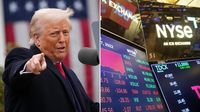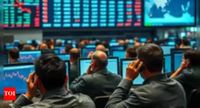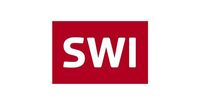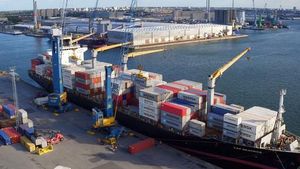On April 9, 2025, U.S. stock markets exhibited a mixed but slightly positive performance in the early hours of trading, driven primarily by the tech-heavy Nasdaq Composite, which surged ahead of its peers. As of 9:50 AM GMT-4, the Dow Jones Industrial Average had climbed by 21.35 points, or 0.057%, reaching 34,924.76. The S&P 500 also posted gains, adding 19.39 points (0.39%) to settle at 5,002.16. Leading the charge, the Nasdaq Composite surged by 190.59 points, or 1.25%, reaching 15,458.50. However, the optimism was tempered by sharp fluctuations fueled by escalating trade tensions stemming from President Donald Trump’s ongoing trade war with China.
The S&P 500 experienced significant volatility, swinging dramatically between a 0.5% loss and a 1.4% gain as the morning unfolded. By 10:15 AM Eastern time, the Dow Jones Industrial Average was down 34 points, or 0.1%, while the Nasdaq Composite had gained 1.1%. These movements reflected the high volatility in global markets, where major indices have been swinging wildly in recent days due to uncertainty over the impacts of Trump’s trade policies.
On the previous night, Trump implemented a new round of tariffs, including a staggering 104% tax on Chinese imports, which went into effect just after midnight. In retaliation, China announced it would raise tariffs on U.S. goods to 84%, effective April 10, 2025. This escalation in trade tensions has fueled fears of a prolonged conflict, with the European Union also approving tariffs on $23 billion worth of U.S. goods in retaliation.
“We’re well into an escalation phase in the trade war, and investors have nothing to hold onto at the moment,” commented Alexandre Baradez, chief market analyst at IG Markets. “What’s clear now is that the U.S. bond market is no longer a safe haven and is piling pressure on stock markets.” As a result, global markets experienced significant declines, with European stocks plummeting more than 4% following the news of the new tariffs.
In the bond markets, the yield on 30-year U.S. Treasuries surged above 5% for the first time since November 2023, signaling growing concerns about the status of U.S. bonds as a safe haven. The turmoil in the bond market spread globally, with UK borrowing costs reaching their highest level since 1998 and Japanese 40-year bond yields hitting a record peak. The U.S. dollar weakened for a second consecutive day, signaling waning confidence among investors.
Shares of major pharmaceutical companies, including Pfizer, Eli Lilly, and Bristol-Myers Squibb, fell by approximately 3% after Trump indicated that the U.S. would soon announce "a major tariff on pharmaceuticals." This news further exacerbated the market’s anxiety, as economists at JPMorgan and Goldman Sachs raised the probability of a U.S. recession as a direct consequence of the tariff war.
“Some level of recession is now a likely outcome from the tariff war,” stated Jamie Dimon, CEO of JPMorgan Chase, during an interview on "Mornings with Maria." He emphasized the need for progress in trade negotiations to calm the markets.
In a show of confidence amid the turmoil, Trump took to his Truth Social platform, urging, "BE COOL! Everything is going to work out well. The USA will be bigger and better than ever before!" His remarks came as a stark contrast to the growing fears among investors, who were grappling with the highest levels of market volatility since the onset of the COVID-19 pandemic.
As the day progressed, U.S. equity futures saw a sharp decline, with the S&P 500 futures dropping 1%, Nasdaq 100 futures slipping 0.8%, and Dow futures falling 1.3%. The Stoxx Europe 600 index also faced heavy losses, plummeting 3.8% as the impact of the tariffs reverberated through global markets.
In currency markets, the Bloomberg Dollar Spot Index fell by 0.5%, signaling weakening confidence in the U.S. dollar. The euro rose 0.7% to $1.1039, the British pound gained 0.4% to $1.2815, and the Japanese yen surged 1% to 144.82 per dollar, as investors flocked to safer currencies amid rising global uncertainties.
The ongoing trade war has not only affected stock prices but has also sent ripples through the commodities market. West Texas Intermediate (WTI) crude oil plunged 5.7% to $56.21 per barrel, while gold prices rose by 2.5%, climbing to $3,057.26 per ounce, as investors sought refuge in precious metals amidst the growing volatility.
In a broader context, the escalating trade war has prompted a bipartisan group of senators to introduce a resolution aimed at repealing Trump’s global tariffs. Senators Rand Paul (R-Ky.) and Ron Wyden (D-Ore.) led the resolution, which was co-signed by Senate Minority Leader Chuck Schumer (D-N.Y.) and several other prominent lawmakers. They argued that tariffs are effectively taxes and that the power to impose such taxes should reside with Congress, not the president.
“Tariffs are taxes, and the power to tax belongs to Congress—not the president,” Paul stated. “It’s time Congress reasserts its authority and restores the balance of power.”
As the day drew to a close, the markets remained on edge, with investors keenly aware of the potential for further escalations in the trade war. The uncertainty surrounding the economic implications of Trump’s tariffs continues to loom large, leaving many to wonder what the future holds for the U.S. economy and its standing in the global market.







